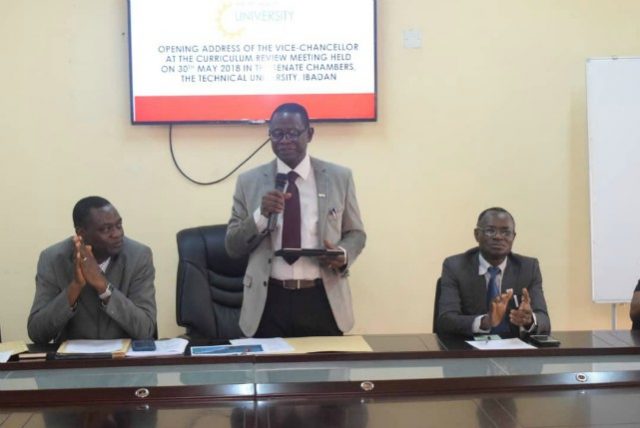
Nigeria’s first technical university, The Technical University, Ibadan, on Wednesday took another step towards bridging the skill deficiency gap that exists between graduates and the industry as it held a curriculum review meeting with industry partners.
Organizations like the Council for the Regulation of Engineering in Nigeria (COREN), Nigeria Employers’ Consultative Association (NECA), the Nigerian Society of Engineers and other bodies represented the industry at the meeting while academics from different institutions were also in attendance.
While speaking at the meeting, the Vice-Chancellor, Professor Ayobami Salami pointed out that the University seeks to address the daunting challenges of youth employment not only through conventional education but, as elaborated in the Strategy for Technical and Vocational Education and Training (TVET), through the incorporation of Entrepreneurial as well as Technical and Vocational Education Training, that is education, training and skills development relating to a wide range of occupational fields, production, services and livelihoods.
He explained that Tech-U will provide the kind of education that helps youth and adults develop technical and vocational skills that they need for employment, decent work and entrepreneurship.
Professor Salami disclosed that the review meeting was premised on “the bold and daring ambition of The Technical University to change the narrative about deficiencies in the employability and entrepreneurial skills of the majority of Nigerian graduates”.
The Technical University intends to champion the mainstreaming of TVET into university curricula as a means of skilling graduates to create employment rather than to seek employment upon graduation. Explaining the reason for the meeting and the invitation of carefully selected strategic partners, the Vice-Chancellor said “the achievement of the goals requires a close collaboration between the academia and labour market stakeholders as well as strong linkages with employment agencies and employers”.
He also pointed out that the parties were selected for their vast accumulated experience either as regulatory authorities, professional associations or as employers of labour in which positions they can bridge the gap between ivory towers and the larger society thatgraduates are prepared to serve. The VC agreed that the world is no longer in a competition of knowledge but competition of independent thinking. “The future is not knowledge driven. It is experience driven and that is what we should focus on”, he said.
Professor Salami continued that “today, you have to think outside the box but in the future, you will need to think without the box. Our current curricula cannot prepare studentsfor the job of the future. We have to change from now the education of the future. It is no longer competition of knowledge but of creativity, learning, independent thinking”.
Engineer Thomas Adewale Toye of TAT Engineering posited that with his over five decades of experience,emphasis needs to be placed on apprenticeship. “Vocational training alone cannot take us anywhere. We need to also look into apprenticeship”. He also challenged the authorities of the university to look inwards. “Now we are suffering because of electricity. Without it we cannot do anything but this university can have her own electricity. There is a river somewhere close by, they can dam it and generate electricity. In Germany, students did everything they needed and companies were there to support them. What we need to do is to re-orientate our students.
He also advised that the university should consider admitting people that have undergone apprenticeship after their school certificate exams.
In the opinion of Mr. Ope Onifade, CEO of Afenoid Entreprises, education is more about learning than certification. He went on to assert that “most times before people gain admission, the certificate they want to obtain is obsolete”. He therefore recommended that the curriculum should be tailored for international best practices.
Packaged by Mayowa Owogbade








































































